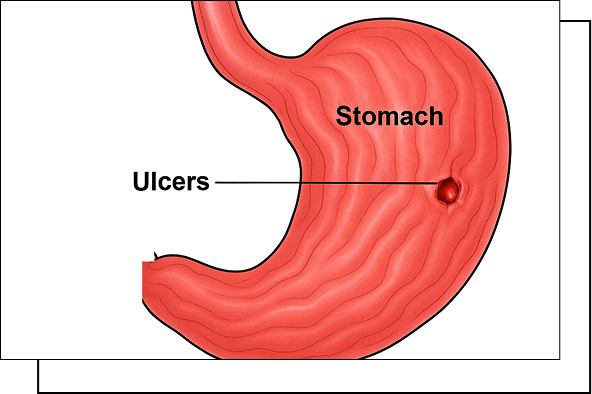Peptic Gastric Ulcer Treatment in Kolkata
Home > Liver Diseases > Peptic Ulcer
Overview
A peptic ulcer is an open sore that develops on the inner lining of your stomach or the upper part of your small intestine, known as the duodenum. These sores can cause a burning or distressing pain in your abdomen.

Symptoms of Peptic Ulcer
Most people with ulcers experience:
Burning stomach pain between meals
Feeling uncomfortably full after eating
Nausea or bloating

Abdomen pain radiating to the back
Dark, tarry stools
Loss of appetite
Dark, tarry stools
Loss of appetite
Book An Appointment
Causes and Risk Factors
The primary causes of peptic ulcers are:
H. pylori infection: A bacterium that weakens the stomach’s protective lining, making it easier for acid to cause damage.
Nonsteroidal anti-inflammatory drugs (NSAIDs): Overuse of painkillers like aspirin, ibuprofen, and naproxen can irritate the stomach lining.
High calcium levels (High calcium levels)
Chronic liver disease like Cirrhosis
Certain medical conditions, such as Zollinger-Ellison syndrome, kidney problems or renal failure
Severe lung conditions, such as Chronic obstructive pulmonary disease
Risk Factors
Excessive alcohol consumption or smoking
Chronic stress
Family history of ulcers
Poor diet may exacerbate symptoms
Evaluation
To diagnose the effects of peptic ulcers, your doctor may ask about your medical history and symptoms. Dr Debjoy Sau, a leading Peptic Ulcer Treatment Doctor in Kolkata, prescribes tests such as:
Endoscopy to view your digestive tract
Blood tests, stool tests and breath tests
Barium swallow X-rays when needed
Gastric antrum biopsy
Treatment & Management
Treating peptic ulcers usually involves a combination of
Antibiotics to treat H. pylori infections.
Acid-reducing medications.
Proton pump inhibitors (PPIs) and H2 blockers to reduce stomach acid and promote healing.
Avoiding NSAIDs and alcohol to allow the ulcer to heal properly.
Dietary modifications.
Stress management techniques.
Note: In rare cases, surgery may be needed for severe ulcers that do not heal with medication.
Preventions
To prevent peptic ulcers, you should:
Limit the use of NSAIDs or take them with food
Quit smoking and reduce alcohol consumption
Practice good hygiene to avoid H. pylori infection
Manage stress through relaxation techniques
Eat regular, balanced meals
Book An Appointment
FAQs
Know Your Answers
Can peptic ulcers lead to cancer?
Though rare, untreated ulcers, especially those linked to H. pylori, can increase the risk of stomach cancer.
What are the long-term effects of peptic ulcers?
Untreated peptic ulcers can lead to complications such as bleeding, perforation, and obstruction. Consult with Dr. Debjoy Sau, a reputed Peptic Ulcer Doctor in Kolkata, for early diagnosis and treatment options.
Is it possible to prevent peptic ulcers?
You can reduce your risk by making lifestyle changes, such as quitting smoking and limiting alcohol consumption.
What foods help ulcer healing?
Foods rich in fibre, probiotics, and vitamin A support healing and protect the stomach lining.
Do all peptic ulcers require antibiotics?
Only ulcers caused by H. pylori infection need antibiotics for treatment.

